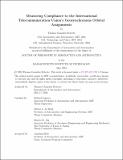Measuring Compliance to the International Telecommunication Union’s Geosynchronous Orbital Assignments
Author(s)
Roberts, Thomas González
DownloadThesis PDF (23.83Mb)
Advisor
Linares, Richard
Terms of use
Metadata
Show full item recordAbstract
Satellites in orbit around the Earth obey more than just the laws of physics; a network of rules, regulations, and guidelines govern their activities, too. In geosynchronous orbit (GEO), countries coordinate their satellite missions to prevent harmful interference in the radio-frequency spectrum and ensure equitable access to the popular orbital regime. The International Telecommunication Union (ITU), a specialized agency of the United Nations, administers this coordination process via rules agreed upon by its member states and encoded in the agency’s extensive Radio Regulations. Although the Regulations have governed GEO satellite operations for more than four decades, the system aches for improvement: member states’ governments spend years in a back-and-forth filing process with the ITU in order to be issued assignments that they then regularly fail to adhere to. For the first time in the public domain, this thesis assesses GEO satellite operators’ compliance with the physical portion of their ITU assignments. By algorithmically comparing historical GEO satellite positions with corresponding ITU satellite network filings using a methodology that references only publicly available data, the study reveals that over 20 percent of satellites have been out of compliance with the ITU’s rules at any given time in recent years. Another 15 percent operate outside of their ITU orbital prescriptions, but within unused portions of the geostationary belt. Non-compliance is shown to be unbalanced across the satellite population. Older satellites are less likely to be in compliance than newer ones. Those operated by government agencies are out of compliance more often than those operated by commercial companies. Military satellites, which may be exempted from ITU coordination processes, follow the rules as often as civil government satellites. Among the largest state operators in GEO, China and the United States exhibit higher compliance rates than Russia. Further insights can be gleaned from individual compliance assessments for the nearly 1,000 GEO satellites included in the study group. The thesis concludes with recommendations for how space-sharing rule-makers can use the tools introduced in this work to improve the efficiency of orbital assignment processes via the mechanisms available to them at the ITU World Radio Conferences.
Date issued
2024-05Department
Massachusetts Institute of Technology. Department of Aeronautics and AstronauticsPublisher
Massachusetts Institute of Technology